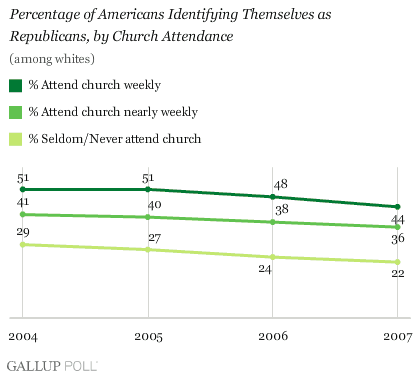Coming Home, pt. 3.5
 A little bit ago, this page discussed a recent New York Times Magazine article entitled "The Evangelical Crackup," which posited that evangelical Christians - a bedrock constituency for the GOP since the 1980s - were beginning to defect from the party over a wide array of issues, to include immigration, the environment and the role of religion in politics.
A little bit ago, this page discussed a recent New York Times Magazine article entitled "The Evangelical Crackup," which posited that evangelical Christians - a bedrock constituency for the GOP since the 1980s - were beginning to defect from the party over a wide array of issues, to include immigration, the environment and the role of religion in politics.
At that time, it was my opinion that some of what's being seen on the part of evangelical Republicans is a function of their disillusionment with politics in general, and with GOP politicians in particular. (To be sure, there have been enough unfortunate situations as of late to disillusion both the religious and political factions within the GOP.)
Quite correctly, the NYT article pointed out that much of the Religious Right's lack of enthusiasm for politics is related to a certain fatigue with President Bush and his handling of the Iraq War more specifically. To a degree, this perception is born out by data from a recent Gallup poll that suggest that there have indeed been decreases in Republican Party identification and the President's job approval among churchgoing whites between 2004 and 2007, with whites who attend church weekly having had a seven percentage point decrease in Republican identification and an 18 percentage point drop in Bush's approval rating since 2004. (In this study, churchgoing served as a proxy for religiosity.)
Interestingly enough, the polling data also demonstrates that while white churchgoers have had a significant disaffection for the Republicans, this effect is no greater than that which has been seen among whites across the spectrum of religiosity, and that the GOP still enjoys "a significant advantage among religious whites compared with less religious whites." All Americans have become less likely over the last three years to identify with the Republican Party, and less likely to approve of the job President Bush is doing. Highly religious Americans have followed this same pattern, but no more -- and no less -- than anyone else. This is particularly true among highly religious white Americans, who have constituted a core base for the Republican Party. Thus, the gap between religious white Americans and whites who are not religious in terms of GOP identification and Bush approval is just as large today as it was in 2004 and 2005. Highly religious white Americans remain one of the strongest pockets of support for the Republican Party in the United States. (Emphasis added.)
So while things are not entirely peaches and cream between evangelicals and the Republican Party, it is not apparent that all is lost just yet. The other fact to consider in all of this is that there is no indication whatsoever that religious conservatives will break to the Democratic Party in support of the likes of Barack or Hillary. Moreover, other Gallup polling suggests that Americans consider current GOP front runner Rudy Giuliani to have the best odds of beating Hillary Clinton in the general election; such an eventuality becomes more likely as Democratic voters have begun to consider her weaknesses.











.jpg)









No comments:
Post a Comment